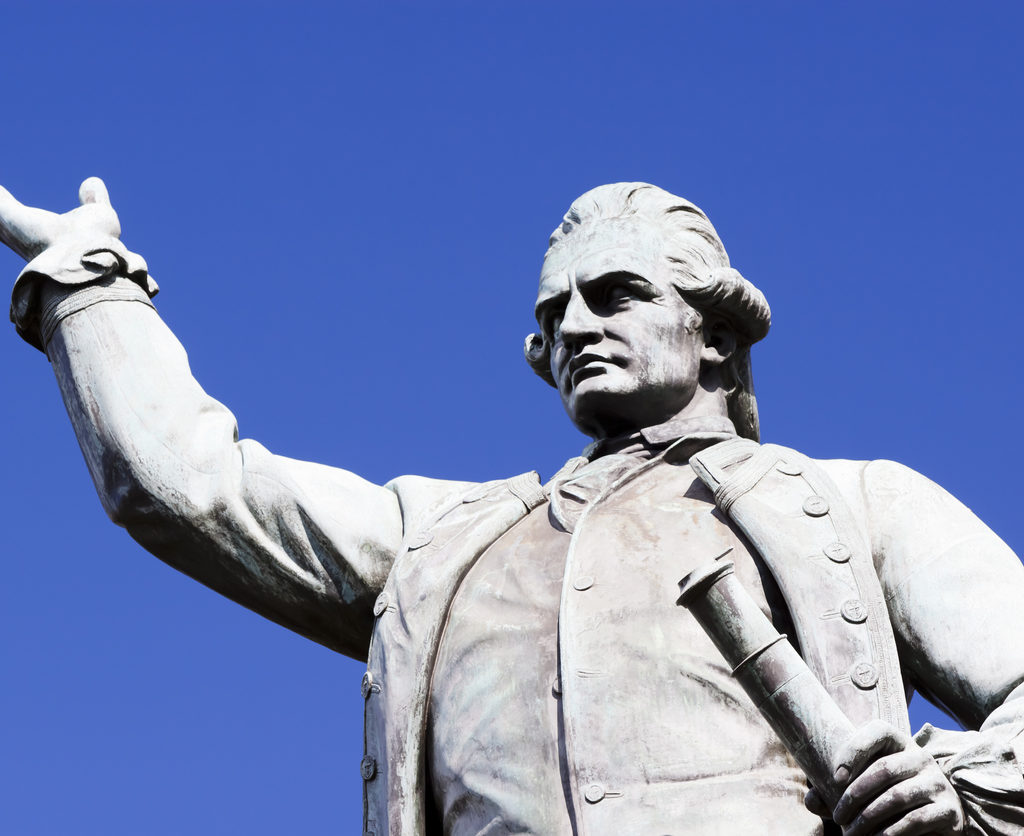Review: James Cook by Peter Fitzsimons
Peter Fitzsimons is a prolific, almost compulsive, biographer and popular historian of so many of the figures and events that have shaped Australian history, and in his latest book he turns to James Cook who, although not Australian of course, was one of the most significant figures for the nation, and, more recently, a controversial one.
The book is filled mostly with an account of Cook’s first journey to the South Pacific; the others are passed over fairly quickly. But the first journey was the most significant – Cook was probably the first European to walk on the east coast of Australia, and he had the dubious honour of finally disproving the rumoured existence of the Great South Land. He also proved to those back home that New Zealand was two islands.
Officially, the purpose of his journey was to record the Transit of Venus in Tahiti. Secretly he was also commissioned to claim the south land, great or not, for Britain. His reconnaissance of Botany Bay, even though he noted its limitations, ultimately led to a trickle of convicts and, finally, a flood of British settlers. (Although Fitzsimons relates the common story that Cook completely missed Sydney Harbour, there has been recent speculation that such an accomplished navigator noted it but kept it a secret from European rivals to Britain.) Even if the idea of ‘discovery’ is contested, seeing as there were already people in most places he ‘discovered’, his cartographic skills were exceptional and paved the way for safer negotiation of the south seas.
Fitzsimons has a novelistic style, with his present tense, exclamation marks, italics, wordplays and little jokes – some even funny (and some ribald – he is writing about sailors, after all). He is also able to convey the drama of the voyage – the monotony broken by danger or delight, the privations, the culture clashes, the wonderment, the innovations and preparations and sheer audacity required in keeping 100 men at sea for two years. At the time, it was like going to the moon.
Fitzsimons contrasts the practical Cook to Cook’s sailing companion, botanist Joseph Banks, who was indulgent to the point of ridiculousness, aristocratic, a man-about-town and ladies’ man. In Fitzsimons’ account Banks was almost indifferent to the suffering and deaths of common sailors or servants but erupted when his precious collections were threatened.
Cook was as ‘humble as a garden potato’, a working-class man elevated through sheer talent and wisdom, a devoted husband, caring not only for his crew, no matter their station, but also the Indigenous people he encountered. Fitzsimons says Cook was not particularly religious, perhaps betraying his own perspective, but Cook’s well-read Bible travelled with him everywhere and his Quaker upbringing inculcated a deep egalitarianism and compassion, as much, anyway, as a hierarchical Navy would allow. In New Zealand Cook was remembered for decades after his first visit as dignified and kind.
But Cook and Banks shared a passion for discovery, and the trip to the South Pacific was a ‘dream’. They were welcomed in uninhibited fashion in Tahiti; in New Zealand they faced a more hostile reception, and in Australia, at what Cook would name Botany Bay, the locals, the Gweagal clan, astonished Cook and his crew by simply ignoring them. (In fact, Sydney’s Indigenous people initially thought the British were malevolent spirits who might go away if unacknowledged.)
The voyage added to European knowledge of Australian flora and fauna, with Banks’ trunks stuffed full of curiosities unimagined. It was less profitable for Indigenous Australians. Cook later decided that the European influence on native populations was negative overall. There is a tension between this and his passion for aggressive discovery. At times Cook provoked hostile attention with his insistence on landing despite being repeatedly told to go away. Although he was commissioned to treat the ‘Natives’ well, he shot at them when threatened, and consumed and collected, in European fashion, in contrast to the conservation practised by Indigenous people.
As Barry Lopez suggests in his recent book Horizon, Cook embodied the Enlightenment’s humanitarian compassion but also its view of European culture as progressive and superior, though interacting with Indigenous Australians shook this view somewhat – both Banks and Cook noted the lack of Indigenous ‘civilisation’, yet contentment.
After meeting the inhabitants Cook dutifully claimed Australia for the British, and as a professional Naval officer, he was simply doing as instructed, but did he do so reluctantly? One can’t be sure. But it quickly ushered in unimaginable and unwanted changes for Indigenous Australians. How then do we regard Cook? Fitzsimons sees him as a talented, wise, extraordinary man, and so rightly admired, but Cook also carried with him the British outlook of explore and conquer, even if he later regretted it, and is a symbol of, or was the leading edge of, the cultural wave that ushered in so much heartache for Indigenous Australians, so some of the animosity directed his way is understandable.
Nick Mattiske blogs on books at coburgreviewofbooks.wordpress.com













1 thought on “James Cook : A controversial legacy”
Cook was an extraordinary man who should be remembered as such. Without him we wouldn’t have the nation we do. We cannot change the past but we can move forward with honesty and respect for those that came before and those we share the country with now.